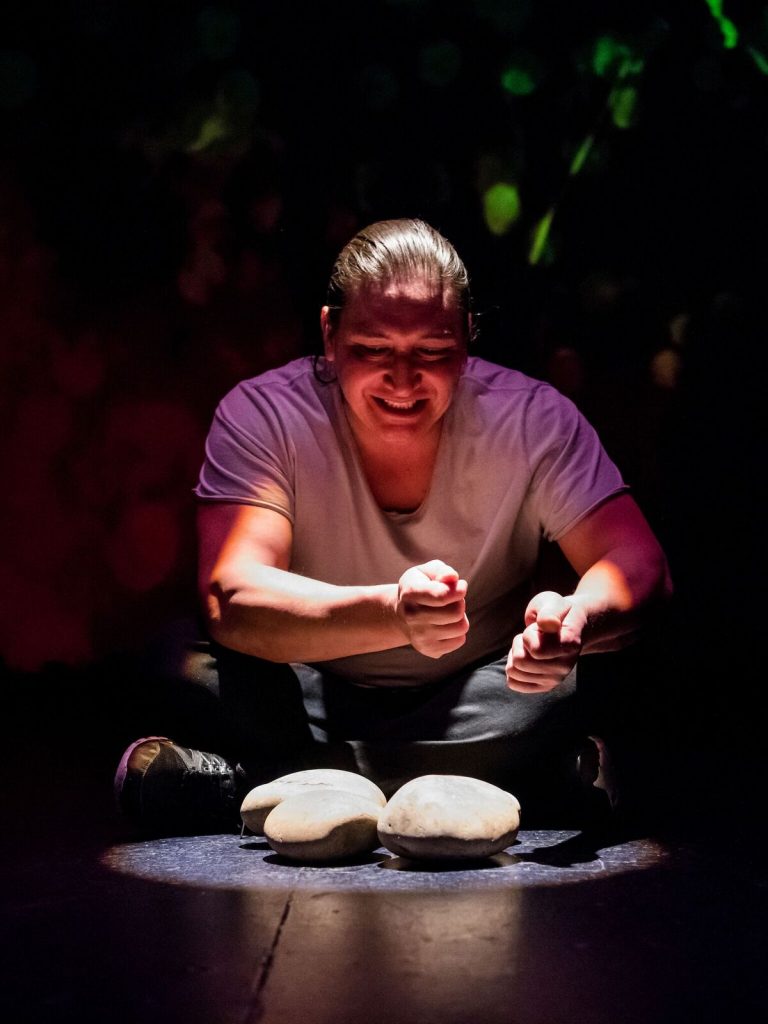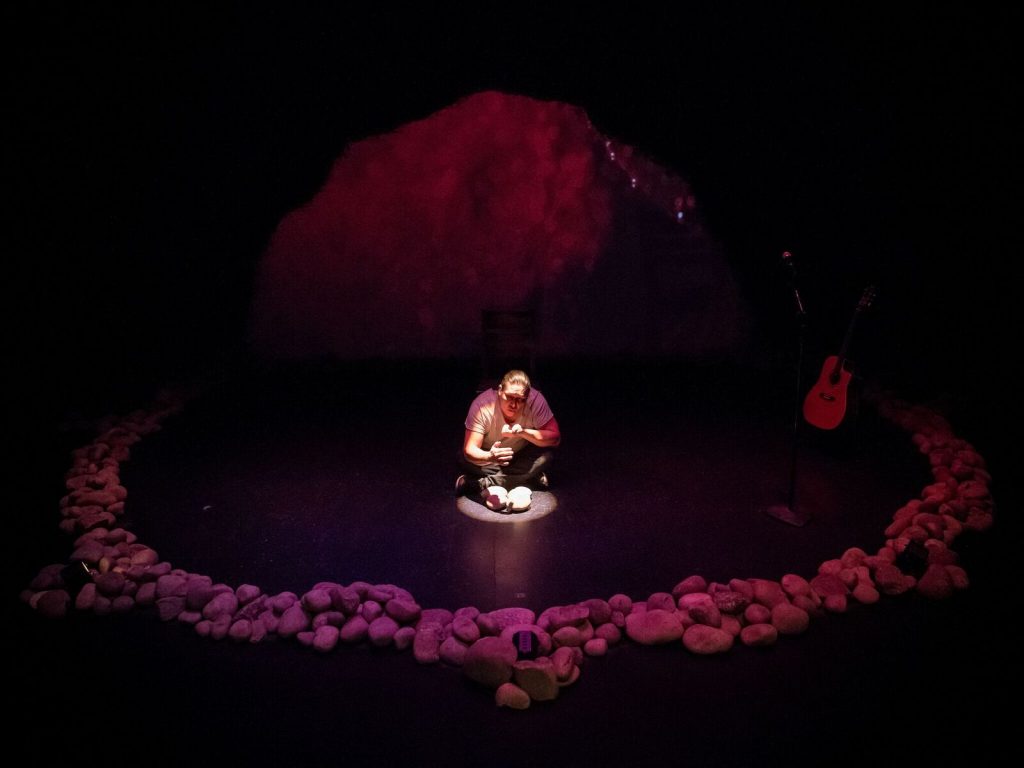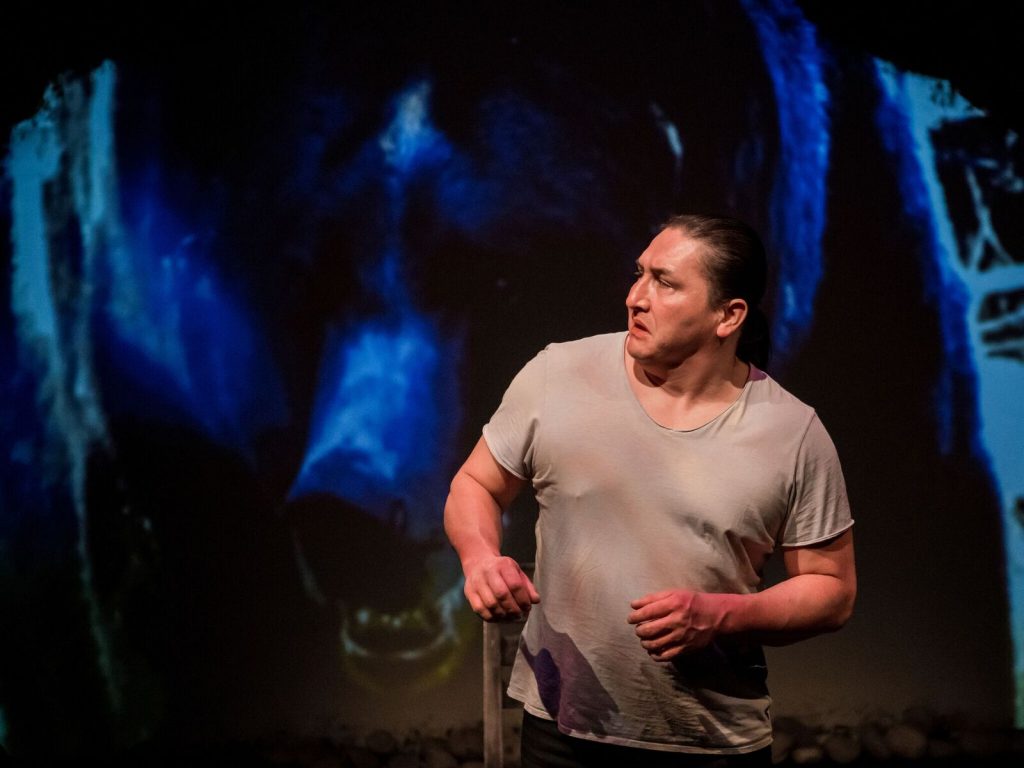
Credit: Marc J. Chalifoux Photography
At the Firehall Arts Centre until May 5, 2018
Tickets from $20 at firehallartscentre.ca or 604-689-0926
Posted April 27, 2018
‘Mutt’ is usually used fondly but dismissively: “Oh, he’s just a mutt”, dog owners might say when asked about the breed of their dog. But mutt lovers can tell you crossbred dogs are robust and interesting and, if you’re lucky, the dogs get the best of all that colourful, mixed-up gene pool.
Actor, writer, stand-up comic, musician and director Sheldon Elter refers to himself as a ‘Métis Mutt’ because his biological father was First Nations and his mother, a fair-skinned, blond, blue-eyed Métis. But growing up in Northern Alberta, Elter was neither “white enough” nor “Indian enough” to fit in anywhere. He was taunted on the playground, called “a bush nigger”.
And if not fitting in wasn’t bad enough, his dad was a wife and child-beating alcoholic – charismatic, yes, but violent. Young Elter wasn’t beaten but his younger brother Derek was, causing Elter to hate himself for his failure to protect both his mother and Derek. “I’m a coward. What can I do?” he asked himself as a little kid. Going toe-to-toe with his drunken father? Not cowardly; just not a good idea.

Credit: Marc J Chalifoux Photography
Métis Mutt began as an 8-minute piece at Edmonton’s 2000 NextFest Emerging Artist Festival and has grown from that point to a full-length show touring all over Canada as well as New Zealand. It’s part stand-up comedy – the genre in which Elter first made his mark – and part an autobiographical coming-of-age story.
It’s hard-to-take at the beginning when Elter, portraying his younger self as a stand-up comedian in some Northern Alberta comedy club, begins by telling racist jokes about indigenous people. “I’m your Native comedian for the evening”, he starts off before getting into self-deprecating, tasteless jokes about being Métis: the non-indigenous part of him “wants to be assimilated” but the Métis part is “too lazy to do it.” It gets worse, much worse. “Why are there only 2 pallbearers at an Indian’s funeral? Because there’s only two handles on a garbage can.”
There’s a canned laughter and applause track that, rather surprisingly, matched the laughter on opening night at the Firehall. It was hard to tell whether the audience was responding empathetically to Elter’s enthusiasm as his younger, bushy-tailed, stand-up self and wanted to support him, or they thought this stuff was actually funny.
Of course, that confusion, that bewilderment about how to respond is a big part of the show; and it pays to keep in mind Elter’s early stand-up days were in rough-and-tough Northern Alberta in the 1990s. A different time and place. But if theatre can change hearts and minds, Métis Mutt just might do it because by 9:30PM, the jokes told at just after 8PM (like “What do you call 40 squaws in a room? A full set of teeth”) were no longer funny. Minds might have changed that night in the Firehall; certainly, hearts were opened.

Set Design: Tessa Stamp
Sheldon Elter is an amazing theatre artist and musician with the ability to don a multitude of personas – from his mother, father, medicine man, friend and magician Marc Savard, girlfriend Twyla and many more. He slips into four or five-year old Sheldon so easily that, despite his hefty build, it’s easy to imagine a frightened little kid cowering on the shed roof. And then, suddenly, he’s back on the stage-within-a-stage doing stand-up and singing self-hating, racist songs. It’s a journey that he takes us on through dysfunctional family life, alcohol and drug abuse and cutting himself to theatre school at MacEwan University.
From an Edmonton Journal interview, Elter admits that the hardest part about doing this show is “that I’m literally holding up a mirror of myself and showing people, ‘Look, I made these jokes and I got paid for it.’ I’m constantly reminded of the shame I carried around. Through the work I am doing, I am trying to make it better and hopefully share that lesson with other people.”

Credit: Marc J. Chalifoux
Presented by the Firehall, produced by One Little Indian Production, directed by Edmonton’s Ron Jenkins with projection design by Erin Gruber, set and lighting design by Tessa Stamp and sound design by Aaron Macri, the show looks good: a semi-circle of smooth stones backed by a screen with constantly changing projected images.
Elter has definitely found his niche and he’s fitting into the Canadian theatre scene in a big way: making a living – and that’s rare enough – and making a difference.

